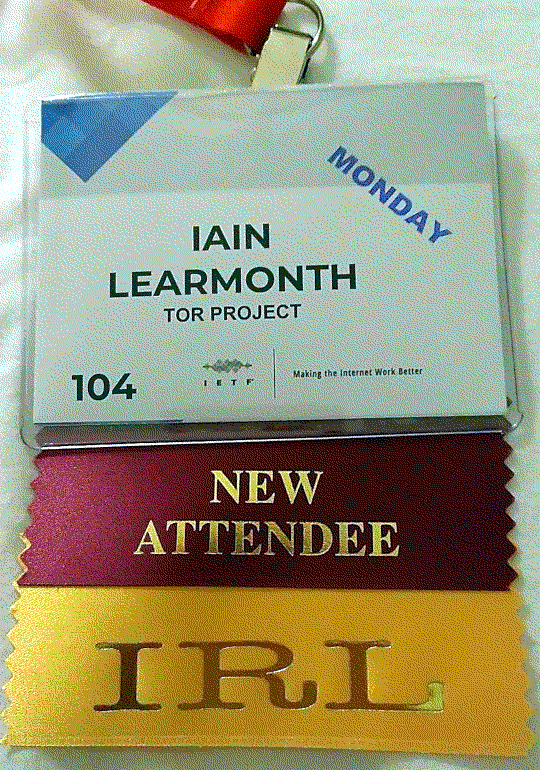IETF 104 in Prague
Published:
Thanks to support from Article 19, I was able to attend IETF 104 in Prague, Czech Republic this week. Primarily this was to present my Internet Draft which takes safe measurement principles from Tor Metrics work and the Research Safety Board and applies them to Internet Measurement in general.

My IETF badge, complete with additional tag for my nick
I attended with a free one-day pass for the IETF and free hackathon registration, so more than just the draft presentation happened. During the hackathon I sat at the MAPRG table and worked on PATHspider with Mirja Kühlewind from ETH Zurich. We have the code running again with the latest libraries available in Debian testing and this may become the basis of a future Tor exit scanner (for generating exit lists, and possibly also some bad exit detection). We ran a quick measurement campaign that was reported in the hackathon presentations.
During the hackathon I also spoke to Watson Ladd from Cloudflare about his Roughtime draft which could be interesting for Tor for a number of reasons. One would be for verifying if a consensus is fresh, another would be for Tor Browser to detect if a TLS cert is valid, and another would be providing archive signatures for Tor Metrics. (We’ve started looking at archive signatures since our recent work on modernising CollecTor).
On the Monday, this was the first “real” day of the IETF. The day started off for me at the PEARG meeting. I presented my draft as the first presentation in that session. The feedback was all positive, it seems like having the document is both desirable and timely.
The next presentation was from Ryan Guest at Salesforce. He was talking about privacy considerations for application level logging. I think this would also be a useful draft that compliments my draft on safe measurement, or maybe even becomes part of my draft. I need to follow up with him to see what he wants to do. A future IETF hackathon project might be comparing Tor’s safe logging with whatever guidelines we come up with, and also comparing our web server logs setup.
Nick Sullivan was up next with his presentation on Privacy Pass. It seems like a nice scheme, assuming someone can audit the anti-tagging properties of it. The most interesting thing I took away from it is that federation is being explored which would turn this into a system that isn’t just for Cloudflare.
Amelia Andersdotter and Christoffer Långström then presented on differential privacy. They have been exploring how it can be applied to binary values as opposed to continuous, and how it could be applied to Internet protocols like the QUIC spin bit.
The last research presentation was Martin Schanzenbach presenting on an identity provider based on the GNU Name System. This one was not so interesting for me, but maybe others are interested.
I attended the first part of the Stopping Malware and Researching Threats (SMART) session. There was an update from Symantec based on their ISTR report and I briefly saw the start of a presentation about “Malicious Uses of Evasive Communications and Threats to Privacy” but had to leave early to attend another meeting. I plan to go back and look through all of the slides from this session later.
The next IETF meeting is directly after the next Tor meeting (I had thought for some reason it directly clashed, but I guess I was wrong). I will plan to remotely participate in PEARG again there and move my draft forwards.